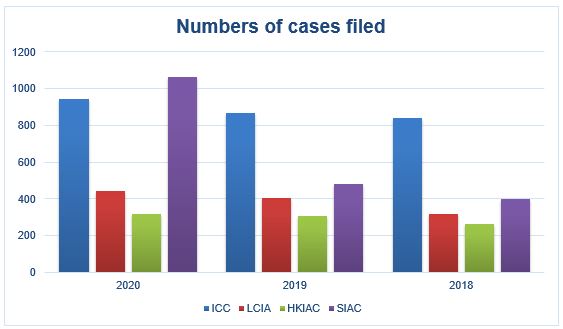The International Chamber of Commerce (the “ICC”) has published its report on dispute resolution statistics for 2020. Mark McMahon reviews the report’s findings.
The ICC publishes these statistics each year, and they are an important source of information, providing data on issues such as:
- The number of disputes handled by the ICC.
- Which parties use ICC arbitration.
- The nature of the disputes dealt with.
- The value of those disputes.
These statistics provide practitioners and their clients with an invaluable data set, enabling them to compare trends across different institutions (such as between the ICC and the London Court of International Arbitration “LCIA”). They allow clients to determine which arbitral institution is best-suited to administer their claims.
The statistics also provide a reassuring reminder that arbitration continues to be the preferred method of resolving cross-border disputes. They demonstrate the ICC’s global reach and position as one of the leading arbitral institutions for complex, international, high-value disputes.
The full report can be found here. Below, we set out an overview of the key developments.
The numbers
- The ICC has seen an increase in claims, with 929 new filings in 2020, leading to a record-breaking 1,833 cases currently being administered under the ICC Rules.
- In 2020, 2,507 parties were involved in cases filed.
- 1,520 arbitrators were appointed and confirmed.
Conversely, the LCIA caseload for the same period in 2020, for arbitrations administered under its own rules, was 407. While a lower figure than the ICC’s, this was still a record for the LCIA. It represented an 18% increase from the previous year, demonstrating significant upward growth in the LCIA’s coverage of claims (case numbers having doubled in the last 10 years alone).
The Hong Kong International Arbitration Centre’s (“HKIAC”) caseload for 2020 was 483, 318 of which were arbitrations and 203 of which were administered by the HKIAC Arbitration Rules.
Meanwhile, the Singapore International Arbitration Centre (“SIAC”) set a record in 2020, with 1,063 new cases administered by SIAC, the highest since SIAC commenced operations in 1991. This represents a 125% increase from the 479 new cases filed in 2019 and a 169% increase from the 402 new cases filed in 2018. SIAC has overtaken the ICC in terms of the increase in caseload.
Parties
- 48% of parties were claimants, and 52% were respondents.
- 31% of cases involved multiple parties.
- Of the 2,507 parties involved in cases filed in 2020, parties came from 145 countries:
– The majority of parties continued to come from the Americas (approximately 25%) and Europe (approximately 40%).
– Africa represented 6.8% of all parties.
– There was a record increase of 17% in the number of parties from the Middle East. The Secretariat of the ICC Court opened its fifth overseas case management office in Abu Dhabi in 2020.
The above statistics demonstrate that the ICC remains one of the most preferred arbitral institutions. The 2021 International Arbitration Survey by Queen Mary, University of London, and White & Case, notes that the ICC stands out as the most preferred institution, followed by SIAC, HKIAC and LCIA. In terms of regional preference, ICC is the most preferred arbitral institution in (i) Africa, (ii) Caribbean/Latin America, (iii) Europe, (iv) the Middle East, and (v) North America.
Rather than resting on its laurels, the ICC has developed a strategy for growth, as demonstrated by the opening of its recent case management office in Abu Dhabi. However, given the uncertainty surrounding recent developments in the region, where the DIFC-LCIA Arbitration Centre has been abolished, the question is whether this was well timed?
As demonstrated by SIAC’s record-breaking caseload in 2020, most of its disputing parties were Indian. This highlights the subcontinent’s position as a significant growth area for arbitral disputes. SIAC’s dominance in the Asia-Pacific region is yet to be beaten by the ICC.
Arbitrators
- Of the 1,520 arbitral appointments, 23.4% (355) were female, an encouraging rise from 21% in 2019, which (one hopes) will set the trend for the future. This development is complemented by the appointment of the first female president of the ICC Court, Claudia Salomon, from 1 July 2021.
– 42% of female arbitrators were nominated by the parties, the ICC Court nominated 40%, and the remaining 18% were nominated by the co-arbitrators to act as chair of the arbitral tribunal.
– 40% of female arbitrators were confirmed/appointed as co-arbitrator, 30% as president and 30% as sole arbitrator.
While appointing authorities and arbitral institutions such as the ICC have a key role to play, the role of counsel (both external and in-house) is as important in encouraging diversity, if not more. By suggesting diverse lists of arbitrators and making their choices from such lists, counsel will have a key role to play in future in this respect.
- Arbitrators came from 92 countries, the most extensive geographical representation of arbitrators recorded to date. The UK continues to be the predominate origin of arbitrators, demonstrating the UK’s position as a centre for international arbitration expertise.
- Single and repeat confirmation/appointment of arbitrators within the year amounted to 66% and 34% of all confirmations/appointments, respectively. This highlights the ever-present subject of repeat arbitral appointments and their impact on the issue of conflicts and disclosures, particularly in light of decisions such as Haliburton v Chubb.
- There were 92 challenges to arbitrators filed in 2020, whether based on alleged lack of impartiality, independence or otherwise. The ICC court accepted only five of these challenges, which demonstrates a high threshold in challenges to an arbitrator.
Place and choice of law
- ICC arbitrations in 2020 were seated in 113 cities in 65 countries, representing the highest number of jurisdictions to date, although the most popular countries remained Switzerland, France, the US and the UK.
- 95% of all cases registered included choice-of-law clauses in the substantive underlying contract. The most frequently selected governing law was English law (13% of all cases registered), again highlighting the faith in English law in international arbitration, followed by Swiss law, French law and the laws of Brazil.
Nature of disputes
- Disputes in the construction/engineering and energy sectors represent the largest areas of dispute, accounting for almost 38% of all cases. This is a slight decrease from 2019, where disputes in the construction/engineering and energy sectors represented 40% of all cases.
- Other sectors representing 5-7% of the newly-registered cases include health/pharmaceutical, general trade and distribution, industrial equipment and services, and financing and insurance. The statistics fail to identify any particular trends in the nature of disputes in light of the Covid-19 pandemic. We will await the 2021 statistics with interest to see if any changes in the nature of disputes being referred to ICC arbitration are apparent due to Covid-19.
Awards, length of proceedings and delays
- In 2020, 564 awards were approved by the ICC Court (142 partial awards, 383 final awards and 39 awards by consent).
- English remains the predominant language of awards (80%), followed by French and Spanish.
- The average length of proceedings in cases that reached a final award was 26 months, the same average duration as 2019. It will be interesting to see if this period can be further reduced over the next year, particularly given the impact Covid-19 has had on delays to merits hearings over the last 18 months. As a result of the pandemic and increasing use and familiarisation with virtual hearing formats, virtual hearings may become the default position for procedural hearings. A hybrid approach could be adopted in the long-term for substantive hearings too. This flexibility may positively impact the duration of proceedings, facilitating confirmation of hearing dates in a much more efficient manner.
- In 2020, 152 draft final awards were submitted to the ICC Court outside the timeframe required in the “Note to Parties and Arbitral Tribunals on the Conduct of the Arbitration” (the “Note”). A reduction of arbitrator’s fees was applied in 49 cases, where the delay was considered significant and could not be attributable to factors beyond the arbitrators’ control or exceptional circumstances. However, the number of final awards submitted with a delay of three to six months (25 awards in 2020) has decreased by half since the practice of fee reduction enshrined in the Note was implemented in 2016. Despite this, there remains room for improvement.
The year 2020 was a busy one for the ICC, as demonstrated by the statistics in the report outlined above, the finalisation of the updated Arbitration Rules (launched in January 2021), and the ICC’s Covid-19 Guidance Note. These developments demonstrate the ICC’s ever-increasing popularity and commitment towards efficient and flexible dispute resolution, even in the face of a worldwide pandemic.
If you have any questions regarding the report or the ICC Rules generally, please contact a member of Stewarts’ International Arbitration department.
You can find further information regarding our expertise, experience and team on our International Arbitration page.
If you require assistance from our team, please contact us.
Subscribe – In order to receive our news straight to your inbox, subscribe here. Our newsletters are sent no more than once a month.





